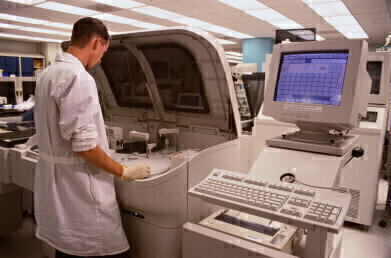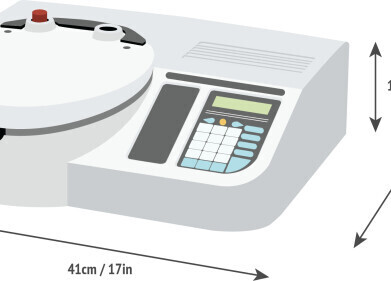Chromatography
The ABCs of mAbs
May 29 2014
Antibodies are proteins developed by the immune system in response to foreign and threatening proteins, known as antigens. They work by attaching themselves to the epitope of the antigen, an amino acid sequence which the antibody is able to recognise and bind itself to. The antigen is then destroyed by the immune system.
An mAb, or monoclonal antibody, is a specific type of antibody that was developed by cloning identical cells from the same unique ancestral immune cell. By contrast, poloclonal antibodies are formed by cloning various different immune cells. Whereas poloclonal antibodies are often obtained from a blood sample of an immunized animal, monoclonal antibodies are developed in the laboratory.
Monoclonal antibodies are so important because they allow scientists to specifically engineer and produce a multitude of antibodies which target specific antigens. This enables them to overcome certain antigens and the health risks attached to them.
How are mAbs produced?
MAbs are produced through a complex process which first involves injecting a subject (customarily a mouse, though rabbits can be used as well) with the protein of which an antibody is desired. The immune system of the subject will then automatically begin to produce an antibody to counter the threat of the protein.
A sample of this antibody is then extracted from the spleen of the subject and mixed with myeloma cells (very similar to cancerous cells). The immortal properties of the myeloma cells help the antibodies taken from the spleen to develop and multiply.
This mixture is then diluted and can be cloned at will. Several different samples are taken and tested for their effectiveness, with the strongest and most binding one being reserved for future use.
What are mAbs used for?
The discovery of mAbs has been an important one for science and they are currently used in all sorts of treatments. Some of these include:
- Cancer Treatment. By developing mAbs that bind only to carcinogenic or cancer-specific antigens, doctors hope to successfully treat various strains of cancer.
- Viral Diseases. Doctors hope that extended research will lead to breakthrough cures for diseases previously thought of as incurable, including AIDS.
- Diagnostic Tests. As well as being used to treat cells, mAbs can also be deployed in order to detect the presence of drugs, hormones or toxins.
For a more in-depth look at the ongoing research into mAbs and their potential applications, read this article: Debottlenecking Antibody Purification Protein A Chromatography with High Titre Feedstocks.
What are their Side-effects?
Because mAbs are proteins, their ingestion or injection can at first cause several undesirable side-effects. These can include, but are not limited to: fever, chills, headaches, diarrhoea, low blood pressure, weakness, nausea, vomiting or rashes. However, in the treatment of cancer, these side-effects are far less widespread or serious as they can be with other, more traditional forms of treatment, such as chemotherapy.
Digital Edition
Lab Asia Dec 2025
December 2025
Chromatography Articles- Cutting-edge sample preparation tools help laboratories to stay ahead of the curveMass Spectrometry & Spectroscopy Articles- Unlocking the complexity of metabolomics: Pushi...
View all digital editions
Events
Jan 21 2026 Tokyo, Japan
Jan 28 2026 Tokyo, Japan
Jan 29 2026 New Delhi, India
Feb 07 2026 Boston, MA, USA
Asia Pharma Expo/Asia Lab Expo
Feb 12 2026 Dhaka, Bangladesh



















